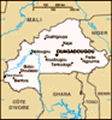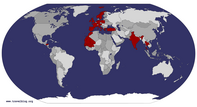Advertisement
Published: September 17th 2007
Once arrived in Koni Kombuaré, Bah, our Dogon guide (see
Spot Me, Greet Me, Hassle Me, Guide Me) had left us in the hands of his friend Alpha to escort us to Bankass and further beyond to the Burkina Faso border. The guy turned out to be the usual egocentric, ‘cool-man-don’t-worry-be-happy’ guy who never shut up and whose company makes one appreciate the beauty of loneliness. Had we spent four whole days together we would have probably arrived to a ‘to win or to die’ epilogue, Clint Eastwood alike. And Bankass would have actually been the most indicated location for an end like “The good, the bad and the ugly” ,with its dust, its bales of straw flying around and its lizards seeking hide underground. I believe I had never set foot in such a God-forgotten, dusty hole as this one: a single dirt road, empty and burnt from the pitiless African summer and journeyed with great parsimony by the rare vehicles direct or coming from the neighbouring Country.
From here on, the road to Burkina Faso became of such an intense red colour to make one think to be driving on the Roland Garros centre court. The sides of the track were still overflowed after the
recent rains, with the base of the trees submerged as if we were in an Amazonian marsh. Nevertheless, constants clouds of red dust arise from the road at the passage of our van. It's the implacable African sun, able to condense in a nothing the usually long earth-mud-clay-dust evolutionary times.
We reached the border post in shamefully poor conditions and our by now dirty red clothes mercilessly contrasted with the neat uniforms wore by the impeccable Burkinabé agents. It’s strange how a simple border crossing, which after all is nothing more than an imaginary line, can transport you in such a far away universe. I mean, according to CIA or World Bank data, Burkina Faso and Mali
enjoy an almost identical socio-economical situation. But then, as a matter of fact, on that side of the border gendarmes are blood thirsty leeches eager to get as much
tips as possible, on this one there are serious and kind agents who even give you the military salute; there the preferred activity of the population seem to be to ask for money for nothing, here instead people busy themselves in a hectic daily routine made of work; there it is rice, rice
and more rice, here the stalls by the roads sell a bit of everything. A mystery? Yes, with a name and a surname: Thomas Sankara.
Recent African history is full of
revolutionaries. People who, in the overwhelming majority of the cases, left their countries in conditions worse than how had they found it and whose only, true aim was (and still is) to remain in power as a long as possible. Kabila, Mugabe, Taylor, all people who one day put together beautiful words of freedom and justice, armed them with Kalashnikovs, use them to chase away the foreign vampires but soon after, forget the principles and make themselves comfortable, instead, on the vacant throne of the most absolute, interested and nepotist power.
Thomas Sankara, instead, has been a true revolutionaries. One of those who stay faithful to an idea even after seizing power. One of those who accumulates enemies rather than millions. One of those who dies young and handsome, like every real hero. Like Jesus. Or like
El Che. He was president of Burkina Faso for a mere 4 years, a short period in which carried ahead previously unknown campaigns of free vaccination, abolished the anachronistic feudal
rights of the richer classes, secularized the country, emancipated women, reduced dowries and wages of ministers and parliamentarians and even replaced their Mercedes with ultra modest Renault 5, using the funds he had saved to build schools in rural areas instead. One like that could not live long.
And so arrives the
coup (and the fatal shot) and Mr.Compaoré. A more orthodox one. One who knows how to say Yes and thank you when something is
freely given to him. One who knows where his place is: to the service of white men and himself. It was 1987, 20 years ago and, guess what? Today, Blaise Compaoré is still president of Burkina Faso. With may thanx from the West and from religious leaders to have extinct the deleterious fire of the true revolution, the one of a world of equals. But bullets can't kill ideas and the Burkinabés have retained that dignity by now extinguished in the inhabitants of all its neighbour countries.
Ouagadougou, Burkina Faso’s capital, is not beautiful but is (reasonably) clean, is not Moscow but has a Red Square, doesn’t have the decadent charm of other African capitals but its buses run on time, is
not photogenic but its sewage doesn’t spit out lurid liquids after every rain. It‘s a city where if one is not in a hurry can easily spend a whole week observing the African skies that open up and let cascades of seasonal rains coming down to wash away months of dust.
But the skies are best observed in the countryside. I had read of a National Park, the
Deux Bales where close encounters with elephants and other wildlife seem to be a fairy common thing. And it was just a few hours away from Ouagadougou, on the national road that bring to Bobo Dioulasso. So I bought a ticket to Boromo, gate of the park, and have finally left behind the addictive laziness of the capital. A few hours later, I set off on foot towards the only camping in the park,
Le Kaicedra. All those who asked which path to take looked at me with deep surprise, all of them agreed on the fact that the camping was too far away to be reached on foot. But the day was exceptionally sunny, a rarity during the rainy season. Nothing could have interposed between me and the pleasure of
a lonesome trekking in a African national park. It was 4pm.
The more I walked, the denser the park vegetation became, while encounters with peasants returning home from the fields became rarer and rarer. All those who I met were extremely kind: the children laughed and hid behind the grown ups, their parents indicated me which was the shortest path to the camping. I felt like a true traveller, one who provokes curiosity, not greed. As it should be. Always. And I needed indeed after Mali, Senegal and Gambia.
Then sunset arrived and the camping was nowhere to be seen. Had I taken the wrong path? Maybe had I got lost in the wood and next would I personalized the African version of
Little Red riding hood? Almost an hour had elapsed from my last meeting with a peasant and I began to worry. After all, to spend the night in the wild, alone, in a African national park don’t think appear in any list of “10 things to do before you die”. Altough it might be in those of “10 things to do to die sooner”.
A man on a bicycle appeared, my last chance to
get assessed on the correct path and on the distance separating me from the camping. The fella reassured me that
Le Kaicedra was “pas loin” (
not far). Morally restored, I resumed the trek at lively speed. Half an hour later, darkness came down on the
Deux Bales National Park and I cursed myself and my exasperated, stubborn tendency to never pay attention to anybody. “Pas loin” was, in fact, “tres, tres loin” and I was alone with self-irony as my only weapon.
I could image the conversation between the policeman investigating the mysterious disappearance of an Italian tourist and my father:
Policeman: “Your son was seen last while walking alone in the twilight in a National Park in Burkina Faso. Was he on drugs by any chance?”
Dad: “Not that I know.”
P: “But, don’t you find this behaviour a bit bizarre? Maybe have he fallen on his head from the cradle?”
D: “No, no, it’s simply a bit weird”.
P: “And -forgive me- haven’t you ever tried to change him?”
D: “Of course we did. As soon as we realized he was defective we drove straight back to the hospital for the substitution but they said that children are like gifts: changes are not admitted once you’ve open the parcel”.
P: “I meant to say, to change his character.”
D: “Oh, that…”
When I feared that my only choice for the night was between sleeping on a tree and let the mosquitoes massacre me and bivouac at ground level and maybe be walked over by a herd of elephants (plus be massacred by the mosquitoes anyway), I sighted a single, tiny light and a humanly shaped shadow. Relief.
Le Kaicedra didn’t have any other customers and the caretaker was just about to leave to return to Boromo for the night. He said it was strange that in such a complete silence he hadn’t heard the arrival of my car. I answered that I had arrived on foot. “On foot? Alone? By night” “Ehm… ehm… just a fortuitous case.”
Le Kaicedra is an oasis of peace. 6 bungalows built on a bend of the Balé river where -during the dry season (November-June)- herds of elephants and springboks go to drink and can be seen and photographed from a mere 5 meters distance. It is also nearly 30euros per night, the higher price I've paid for lodging since I’m in Africa. I stayed for just one day. No elephants in sight. In the wet season they don’t need to come all the way down to the river given the abundance of water pools created by the heavy rains. But the trek and its correlated fears were worthy anyhow. Nothing is tasteless under African skies.
ITALIANO La versione italiana di questo blog la trovi sul sito Vagabondo.net
Link:
Sotto i Cieli d'Africa
Advertisement
Tot: 0.31s; Tpl: 0.012s; cc: 40; qc: 147; dbt: 0.1602s; 1; m:domysql w:travelblog (10.17.0.13); sld: 1;
; mem: 1.6mb













er Sanchere
non-member comment
small places
Hola Companero, it seems a very well laid-back scenario in there. I found a message in this blog: when you start to surrender, Magic appears! Looks like another planet. cheers